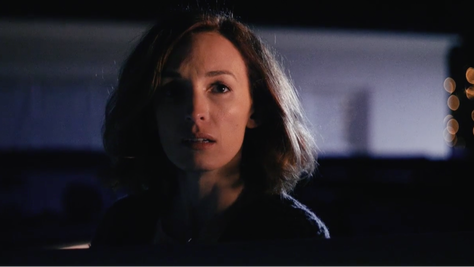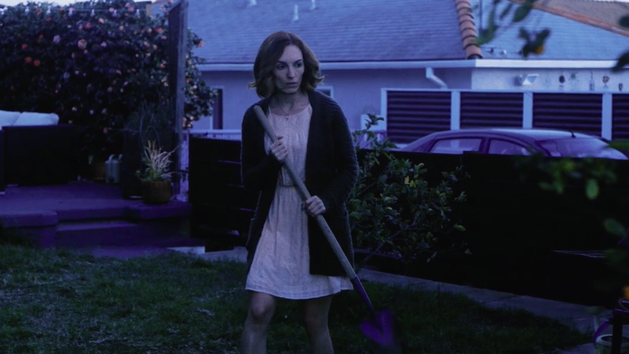 Women have long been depicted in American horror as potential powder kegs of severe psychological and emotional decline... ...The dread or uneasiness that accompanies this portrayal affects the way viewers respond to women onscreen. Either the female character initially presents as unstable due to a previously (sometimes wrongly) diagnosed disorder or she journeys along a mental decline as some outside force (real, imaginary, supernatural, etc.) pushes her up to and beyond her breaking point. Regardless of how she arrived at it, the audience fears the mental disconnection, and the emotions and erratic actions of the character perpetuate viewers’ anxiety. The reality of the discomforting awareness these characters possess can be seen in such films as Misery (1990), What Ever Happened to Baby Jane? (1962), and The Loved Ones (2009), all of which present at their core a woman whose tenuous grasp on reality pushes her to violence. The question of women’s psychological instability is anxiously centralized in Mikael Kreuzriegler’s Deany Bean is Dead. The film approaches psychological well-being differently from previous genre films and clearly intends to appeal to a viewer who understands mental health as a sympathetic role rather than the villain. Early 30-something Deany Locke (writer Allison Marie Volk) finds her life in upheaval when information she gained from stalking her ex causes her to separate mentally and emotionally from her friends and job. No matter if at work, home, or the safe space of a meditation circle, Deany’s mind becomes bombarded with cruel comments and rude behavior. Perhaps real, perhaps not, but all aimed at further disrupting any mental stability she might have. An over-bearing, yet physically fragile, boss named Maxine Williams (Wendy Wilkins) pushes Deany when she is already low and her inner-dialogue (masking as the Murder Macabre podcast) provides a step-by-step procedural on how to end a life and hide the body. So, after a few horrible interactions, Deany can no longer control her impulses and the limp body of Maxine goes from the parking garage to Deany’s car to former lover Tom (Christopher Glenn Cannon)’s backyard. Deany Bean opens with a binocular-created close-up of the house where the main character and her former fiancé used to live. The shot, even without context, establishes Deany’s obsessive behavior and serves as a shorthand way of constructing the observational nature in which she approaches her life. She finds difficulty in engaging with friends or creating new relationships, so she distances herself from others. Most of the story takes place at Tom’s house, but many of the scenes occur as glimpses around corners or truncated conversations heard through cracked doorways. The obstructed view of some conversations puts the audience into the role of eavesdropper and, as an uninvited guest to the party, we further feel the emotional distance Deany feels throughout her day. Despite a support group, a best friend, and common sense telling her to move on with her life, she continually finds herself lurking around Tom’s house. What keeps Deany from moving on? Is it the undying love she experienced when she was with Tom? Does she know a deep dark secret about Tom’s new fiancée Angela? Or is it the Murder Macabre Podcast that plays constantly in Deany’s head and narrates her life? Yet, despite demonstrating unhealthy behaviors towards herself and others, and the murder-focused disembodied voices playing in her head, Deany Bean is Dead still dares us to sympathize with our mentally unstable killer. Subjecting the audience to the continually playing podcast and witnessing all events through Deany’s eyes puts us in a weird predicament—what we see and know differs from how other characters perceive and understand events. Obviously, Volk does not present us with the most reliable of narrators, but Deany breeds further confusion because she does not always make it clear if she understands the difference between reality and the lies she tells herself and others. One of Deany Bean’s most interesting moves is the removal of the crazed woman as a shrieking unkempt and/or frumpy idiot trope. When Deany first appears on screen she looks mousey but well-groomed, and even when she risks being exposed or accused as a liar or murderer, she uses composure and correctly chosen words as an attempt to distract away from herself. Obviously, the attack on her boss was spontaneous, but the violence comes quickly and Deany does not prolong any further frustrations on the body. Similarly, when at the party and angrily confronted by Angela (Sarah Siadat) and other party-goers about her intentions, job, and even possible connection to a suicide, Deany grows aggravated and frustrated with the accusations (regardless if they are true or not), but her reactions remain level-headed no matter how many murderous insights the podcast plays for her. The viewer’s temptation to identify with Deany adds to the uncomfortableness of the situation because of the way Tom and Maxine become framed through Deany’s eyes. As more of Deany’s life is revealed we begin to blur the line between the character’s approach to life and her neurotic tendencies. Unlike Annie Wilkes of Misery or Lola of The Loved Ones, Deany’s obsessive qualities blind the viewer to any past murderous or stalker-ish digressions; instead, she manages to come off as sweet and misunderstood. In fact, the heroine of this murder-podcast narrated rom-com holds significant similarities with the title figures of Carrie (1976) or May (2005). Through an in-depth look into the mind of the main character, Volk and Kreuzriegler proficiently challenge our perception of mental health and motivation with their creation, perception, and depiction of Deany. The rom-com tropes of the film might lead some viewers into a false sense of security or annoy others with their awkwardness, but try to remember, reality and love both die when you least expect it. Deany Bean is Dead arrives On Demand July 10th from Global Digital Releasing. By Amylou Ahava Enjoy Amylou's writing? Leave her a tip here through Ko-fi!
0 Comments
Leave a Reply. |
Archives
March 2023
|


 RSS Feed
RSS Feed